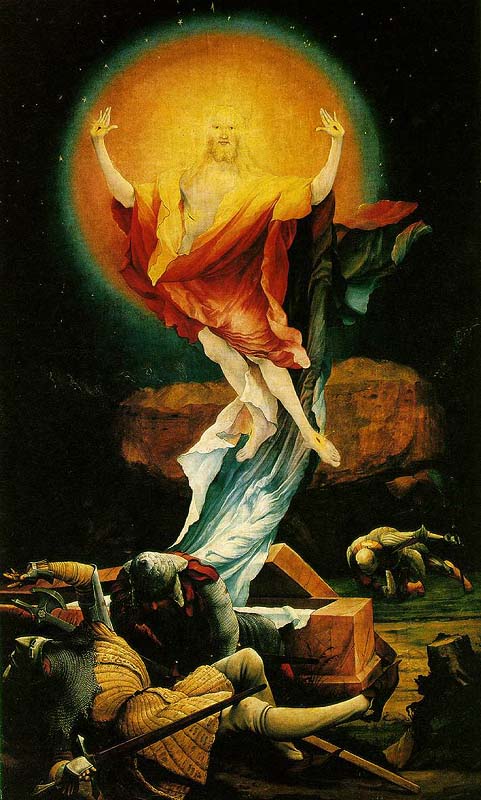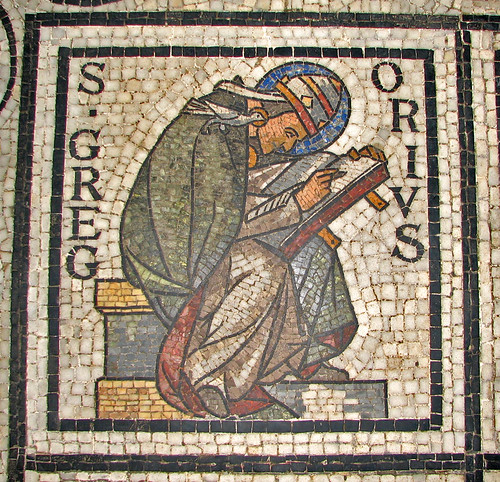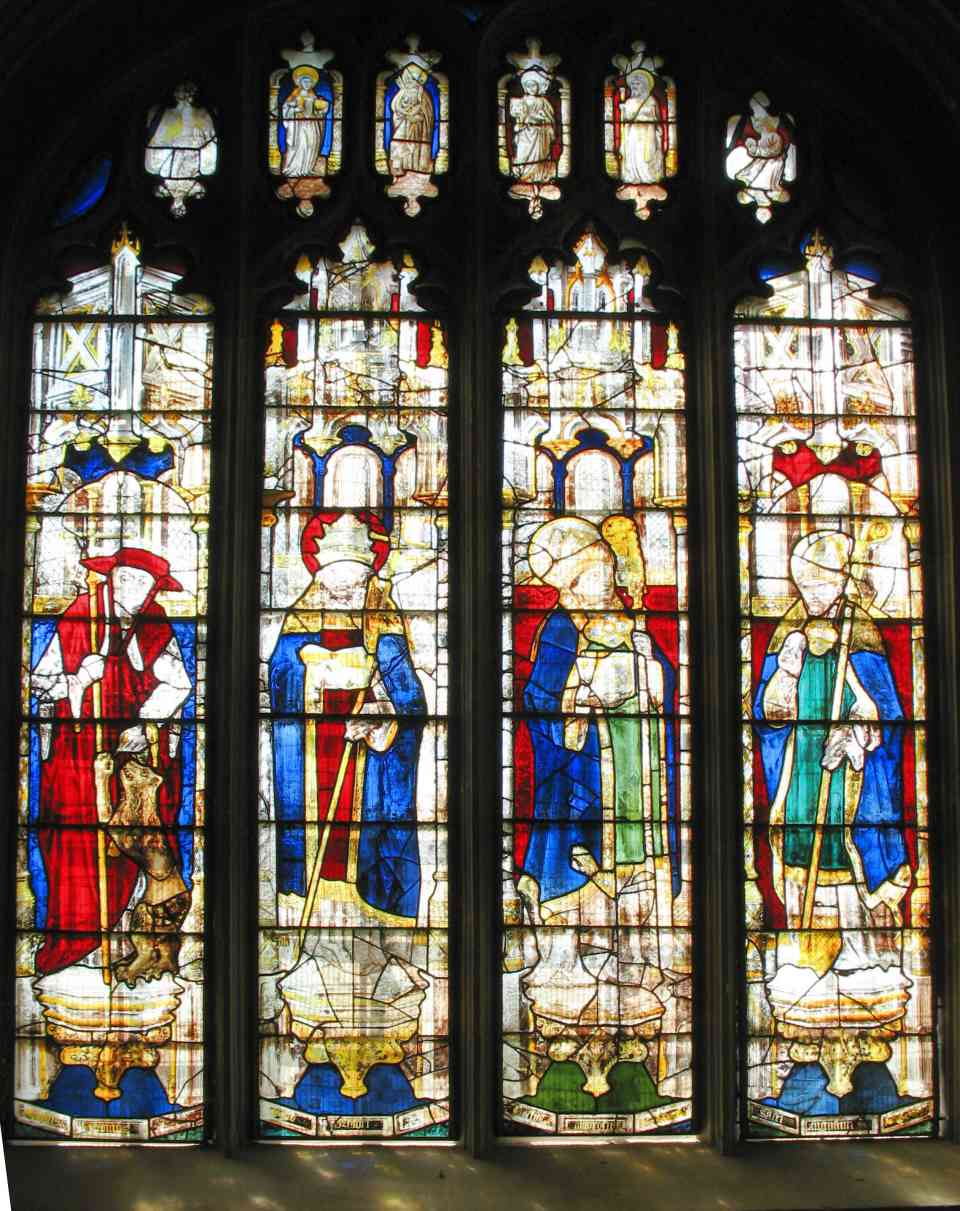 | Clyde McLennan - Rise, my soul, to watch and pray .mp3 |  |
 | ||
 | Found at bee mp3 search engine |  |

 | Clyde McLennan - Rise, my soul, to watch and pray .mp3 |  |
 | ||
 | Found at bee mp3 search engine |  |

 Previously unpublished lecture by C. F. D. Moule on the resurrection as the controlling event of early Christian experience.
Previously unpublished lecture by C. F. D. Moule on the resurrection as the controlling event of early Christian experience. Make no mistake: if He rose at all
Make no mistake: if He rose at all
 Some people think that I'm not "nice" because I hold vowed officers of the church to the faith handed down by the apostles. Well, on this March 12, commemoration of Gregory the Great, Doctor of the Church and Bishop of Rome, I'm going to try to be more gregarious. . . or at least Gregorian.
Some people think that I'm not "nice" because I hold vowed officers of the church to the faith handed down by the apostles. Well, on this March 12, commemoration of Gregory the Great, Doctor of the Church and Bishop of Rome, I'm going to try to be more gregarious. . . or at least Gregorian.Gregory was born around 540, of a politically influential family, and in 573 he became Prefect of Rome; but shortly afterwards he resigned his office and began to live as a monk. In 579 he was made apocrisiarius (representative of the Pope to the Patriarch of Constantinople). Shortly after his return home, the Pope died of the plague, and in 590 Gregory was elected Pope.
Like Leo before him, he became practical governor of central Italy, because the job needed to be done and there was no one else to do it. When the Lombards invaded, he organized the defense of Rome against them, and the eventual signing of a treaty with them. When there was a shortage of food, he organized the importation and distribution of grain from Sicily.
 His influence on the forms of public worship throughout Western Europe was enormous. He founded a school for the training of church musicians, and Gregorian chant (plainchant) is named for him. The schedule of Scripture readings for the various Sundays of the year, and the accompanying prayers (many of them written by him - and still sung!), in use throughout most of Western Christendom for the next thirteen centuries, is largely due to his passion for organization. His treatise, On Pastoral Care, while not a work of creative imagination, shows a dedication to duty, and an understanding of what is required of a minister in charge of a Christian congregation.
His influence on the forms of public worship throughout Western Europe was enormous. He founded a school for the training of church musicians, and Gregorian chant (plainchant) is named for him. The schedule of Scripture readings for the various Sundays of the year, and the accompanying prayers (many of them written by him - and still sung!), in use throughout most of Western Christendom for the next thirteen centuries, is largely due to his passion for organization. His treatise, On Pastoral Care, while not a work of creative imagination, shows a dedication to duty, and an understanding of what is required of a minister in charge of a Christian congregation.
Doctrinally speaking, there is little of great interest. He is known to have defended the physical resurrection from a subtle attack by no less than the Patriarch of Constantinople himself! Eutychius speculated on our resurrection bodies being "more subtle than air" but there is a record of his having recanted before death. (Hey...maybe I'm gregorious in dealing with my own Eutychius after all! With him, I say Pro cuius amore in eius eloquio nec mihi parco - "For the love of whom (God) I do not spare myself from his Word.") Gregory's letters and sermons are still readable today, and it is not without reason that he is accounted (along with Ambrose, Jerome, and Augustine of Hippo) as one of the Four Latin Doctors (=Teachers) of the ancient Church. (Athanasius, Gregory of Nazianzen, Basil the Great, and John Chrysostom are the Four Greek Doctors.)

English-speaking Christians will remember Gregory for sending a party of missionaries headed by Augustine of Canterbury (not to be confused with the more famous Augustine of Hippo) to preach the Gospel to the pagan Anglo-Saxon tribes that had invaded England and largely conquered or displaced the Celtic Christians previously living there. He was moved when he saw some fair-haired, blue-eyed Angle boys being sold in a slave market and quipped: "Non Angli, sed Angeli!" (they are not Angles, but Angels!) Gregory had originally hoped to go to England as a missionary himself, but was pressed into service elsewhere, first as apocrisiarius and then as bishop of Rome. He accordingly sent others, but took an active interest in their work, writing numerous letters both to Augustine and his monks and to their English converts.

I here mention something that was not Gregory's doing, but is an important part of Church history. It was in Gregory's lifetime that Rome, and with it the Western Empire, with astonishing suddenness, and for no reason that I know of, went monolingual. For more than six centuries previously, Greek had been spoken at Rome along with Latin. Every Roman with pretensions to being educated could speak it. Everyone involved in shipping and commerce, from banker to stevedore, could speak it. The list of the early Bishops of Rome has a fair proportion of Greek names. When Paul wrote an epistle to the Romans, he wrote in Greek as a matter of course. But in Gregory's lifetime this changed. Gregory was ambassador to the Eastern Patriarch at Constantinople for six years, but he never bothered to learn Greek. And in his day (not, as far as I have any reason to believe, as a result of his example or influence) most other Latin-speakers did not trouble to learn Greek either. The already existing difficulties of communication between Latin and Greek theologians were greatly exacerbated by this development. Increasingly, Latins did not read the commentaries and other writings of Greek Christians, and vice versa. Thus differences between the two that dialogue might have resolved were left to accumulate, culminating in the formal split between Latin and Greek Christendom in 1054.
If I were to select a ground on which this devout Christian of great accomplishments might reasonably be censured, it would be that his Dialogues, a book on the Lives of the Saints, is full of accounts of dreams and visions that various persons were said to have had of souls in Purgatory. Gregory, a man of keen critical judgment on many matters, was completely uncritical in his acceptance of these stories. A general belief in Purgatory was standard among Christians when he wrote; but his reliance on "ghost stories" to fill in the imaginative details gave the doctrine as held thereafter in Latin Christendom both a prominence and a coloring that it had not previously had, with results that many Christians, including adherents of the Pope, have found regrettable - and a constant impediment to church union.
Almighty and merciful God, who didst raise up Gregory of Rome to Be a servant of the servants of God, and didst inspire him to send missionaries to preach the Gospel to the English people: Preserve in thy Church the catholic and apostolic faith they taught, that thy people, being fruitful in every good work, may receive the crown of glory that fadeth not away; through Jesus Christ our Lord, who liveth and reigneth with thee and the Holy Spirit, one God, for ever and ever.
Almighty and merciful God, who raised up Gregory of Rome to Be a servant of the servants of God, and inspired him to send missionaries to preach the Gospel to the English people: Preserve in your Church the catholic and apostolic faith they taught, that your people, being fruitful in every good work, may receive the crown of glory that never fades away; through Jesus Christ our Lord, who lives and reigns with you and the Holy Spirit, one God, for ever and ever.
--Martyn Lloyd-Jones, Exposition of EphesiansYou cannot separate what a man believes from what he is. For this reason doctrine is vitally important. Certain people say ignorantly, "I do not believe in doctrine; I believe in the Lord Jesus Christ; I am saved, I am a Christian, and nothing else matters". To speak in that way is to court disaster, and for this reason, the New Testament itself warns us against this very danger.
We are to guard ourselves against being "tossed to and fro and carried about with every wind of doctrine", for if your doctrine goes astray your life will soon suffer as well.
So it behoves us to study the doctrines in order that we may safeguard ourselves against certain erroneous and heretical teachings that are as rife and as common in the world today as they were in the days of the early Church.




Over at Evangelical Outpost, they've posted an academic paper showing that vampires can't be real because they would have destroyed the human population by now. One problem - as anyone who has played Vampire: The Masquerade or read Anne Rice would know: Vampires don't have to kill the living in order to feed. Moreover, simply being bitten by a vampire isn't sufficient to turn the victim into one. Therefore, the smart vampire would feed selectively and never deplete the food supply.
Zombies, however, have no such finesse. They are a true scourge. And they hold particular horror for those of us who actually do believe that the dead have risen in the past and will rise in the future. And whose original sect was persecuted for "cannibalism" by the Romans. I'm starting to smell Jungian archetypes.... Or maybe Paul had something else in mind when he was talking to those wacky Galatians.
(post title taken from the best Simpsons Halloween segment ever!)There is much interlocking of the branches, but the two tendencies, Modernism and supernaturalism, or (otherwise designated) non-doctrinal religion and historic Christianity, spring from different roots. In particular, I tried to show that Christianity is not a "life," as distinguished from a doctrine, and not a life that has doctrine as its changing symbolic expression, but that--exactly the other way around--it is a life founded on a doctrine.
Eschatological death is past for us—Jesus paid it all.In that spirit, I encourage you all to take this whimsical test by Gary Habermas.
Eschatological judgment is past for us—Jesus endured it all.
Eschatological wrath is past for us—Jesus bore it all.
Eschatological righteousness is present for us—Jesus has it all.
Eschatological forgiveness is present for us—Jesus gives it all.
Eschatological life is present for us—Jesus lives it all.Even now to those who are in Christ Jesus—no condemnation!
Even now to those who are in Christ Jesus—no more wrath!
Even now to those who are in Christ Jesus—no more death!
Even now to those who are in Christ Jesus—you are justified!
Even now to those who are in Christ Jesus—you are forgiven!
Even now to those who are in Christ Jesus—you have been raised from the dead!
